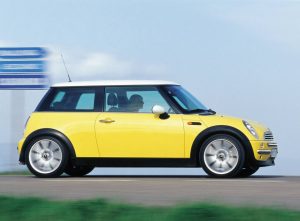Recalls: Mini R50/R53 Cooper
Overview
Manufacturers, or importers, issue recalls for defects or faults which have the potential to cause injury. Generally, manufacturers will inform the original buyers if their vehicle is subject to a recall and of the steps required to remedy the defect or fault. Please note that the recalls below (if any) are for Australian-delivered vehicles only. Furthermore, the number of recalls should not be taken as an indication of a model’s reliability or its safety more generally.
Recalls: Mini R50/R53 Cooper
- In March 2003, a recall was issued for model year 2002 Mini R50 Cooper and R53 Cooper S vehicles as the rear lower spring strut threaded connection may cause a failure of the mounting bolt (PRA 2003/6031).
Problems and faults: Mini R50/R53 Cooper
Overview
This section identifies potential problems, causes and fixes based on the experiences of owners and repairers, online sources and technical service bulletins. This information is provided solely for reference purposes and AustralianCar.Reviews recommends that only properly qualified persons carry out repairs or modifications. Furthermore, the number of items below should not be taken as an indicator of a model’s reliability or the frequency with which they may occur.
To report a problem or fault to the AustralianCar.Reviews team, please use the Contact Us form. Note that AustralianCar.Reviews does not offer advice on automotive problems or disputes; such enquiries will not receive a reply. For vehicles purchased from dealers after 1 January 2011, please see our Australian Consumer Law fact sheet.
2001-05 MINI R50 Cooper and R52 Cooper S: power steering failure
In October 2015, a recall was issued in the USA for MINI R50 Cooper and R53 Cooper S vehicles that were produced from 12 September 2001 to 9 February 2005. In these vehicles, the power assisted steering system could fail intermittently or permanently. If this occurred, significantly greater force would be required to steer the vehicle – this increased the risk of a collision. If the power steering pump had a part number in a particular range, the pump and fan were to be replaced. If the wiring harness connector on the power steering pump had sustained corrosion or damage, it was also to be replaced. For further information, please see Service Bulletin SI M32 02 15: Power Steering Recall 15V-660.
R50 Cooper and R53 Cooper S: Tritec (W10 and W11) engines
- Cracked cylinder head: overheating can result in a cracked cylinder head; a common cause of overheating is failure of the cooling fan thermostat which prevents the cooling fan from activating. Unfortunately, the Cooper does not have an engine temperature gauge on the dashboard.
- Oil consumption: typical oil consumption is around 250 ml per 1000 miles (approximately 1600 km). Common locations of oil leaks include the sump and oil filter surrounds.
- Rattling noises: Rattling noises may be due to either the hydraulic tappets or a loose timing chain tensioner which requires tightening.
R50 Cooper and R53 Cooper S: deposits in W10 and W11 engines
In August 2010, BMW MINI issued technical service bulletin SI M13 01 07 for R50 Cooper vehicles with the W10 engine and R53 Cooper S vehicles with the W11 engine. In these vehicles, deposits in the injection and induction system may cause driveability complaints and the ‘Service Engine Soon’ light to be illuminated. This condition could be caused by:
- Deposits at the fuel injector’s tip which affected fuel flow and the air/fuel mixture ratio. Symptoms included hesitation or stumble during acceleration or loss of power; poor fuel efficiency; increased HC and CO emissions; and, the ‘Service Engine Soon’ lamp to illuminate due to misfire faults;
- Carbon deposits at the valves and on the intake manifold ports absorbing fuel during the warm-up phase, causing a leaner air/fuel mixture. Carbon deposits (or build-up) could also disturb the mixture flow at low throttle conditions and/or idle speeds. Symptoms of carbon deposits included a loss of power; unstable and/or rough idle; increased HC, CO and NOx emissions; and, the ‘Service Engine Soon’ lamp to illuminate due to intermittent misfire faults; and,
- Combustion Chamber Deposit Interference (CCDI) when there was contact between carbon deposits on the piston crown and the cylinder head. The noise created by this contact may be misdiagnosed as a ping, knock or other mechanical failure. CCDI occurs first as a cold start noise that can fade as the engine reaches operating temperature. As deposits build, there is an increase in compression temperature that may cause pre-ignition detonations. Symptoms include knocking, pining, poor acceleration, increased NOx emissions and engine idle speed surges.
Transmission
- There have been reports of the continuously variable transmission (CVT) failing as early as 80,000 kilometres.
- The gearshift cable may come loose from the transmission shifter linkage, requiring the installation of a retaining clip.
Suspension
- Knocks or noises from the front suspension may be due to worn anti-roll bar links.
- If the vehicle pulls to the left, the front suspension turrets may be out of alignment.
- Knocks or noises from the rear suspension may require the top suspension mount bushes to be replaced.
- For older/high mileage models, rear suspension noise may require the wishbones to be replaced.
Other problems and faults: Mini R50/R53 Cooper
- Electrical: Electrical problems were not uncommon, affecting the central locking system, warning lights and speedometer, while the ABS pump wiring could cause the pump bracket to short-circuit – this would require the wiring loom to be replaced.
- Steering: A whining noise from the steering during low speed manoeuvres is regarded as normal operation of the electric steering pump, though excessive noise may indicate low fluid levels. If the wiring is corroded, however, there may be no power assistance and the steering pump may require replacement (see ‘power steering failure’, above).
- Rust: For early models, water could collect in the door sills and cause rust under the rubber seals or under the plastic step plate.




